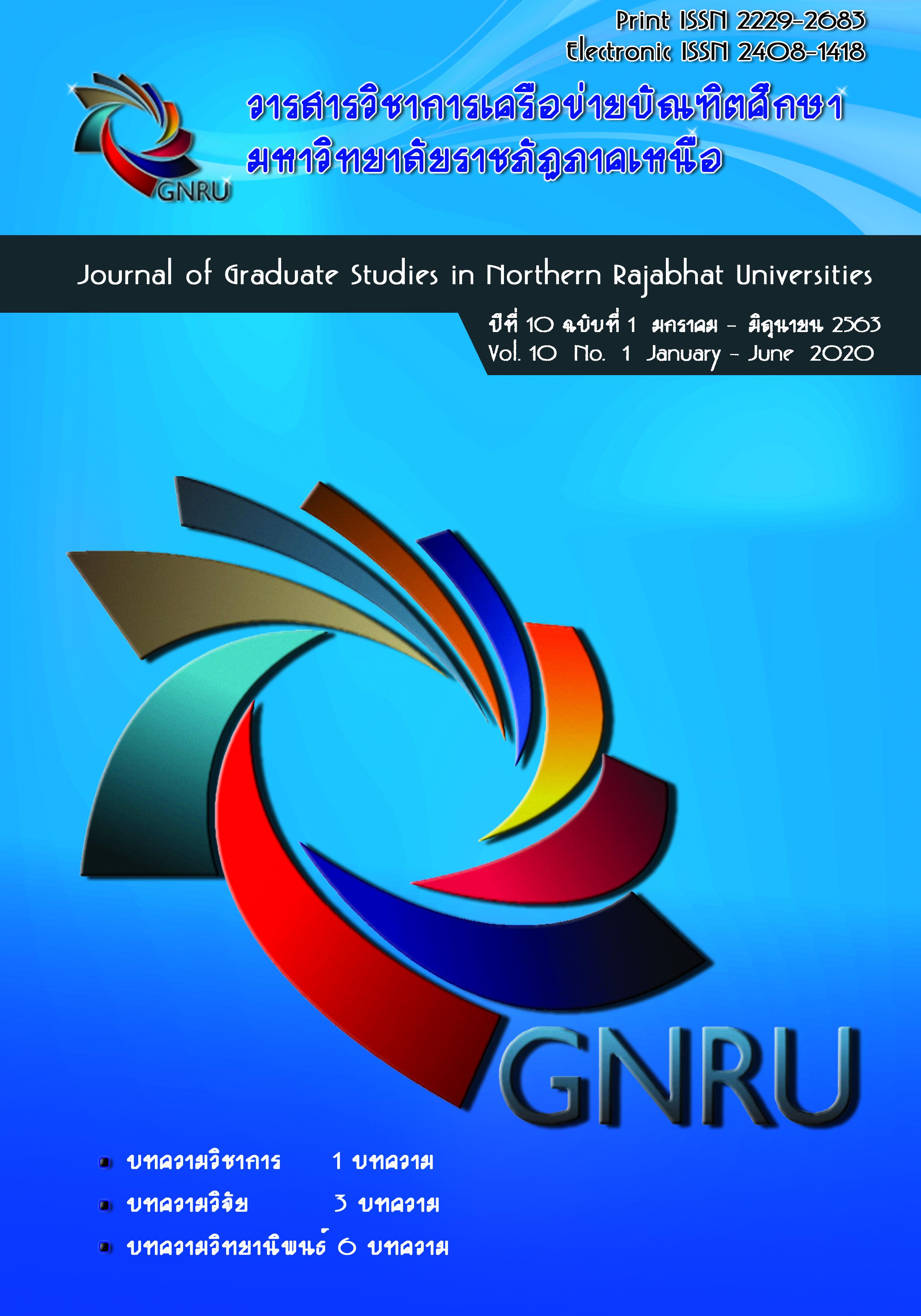บัณฑิตพัฒนาชุมชน : วิเคราะห์ผลสำรวจและแนวทางพัฒนาคุณลักษณะ ตามอัตลักษณ์ของบัณฑิตที่สำเร็จการศึกษาจากมหาวิทยาลัยแห่งหนึ่งในภาคใต้ Graduate of Community Development: Analyzed from survey results and guidelines for character development of graduates from a university in the southern region
Main Article Content
Abstract
บทความครั้งนี้มีวัตถุประสงค์เพื่อศึกษาวิเคราะห์ผลสำรวจคุณลักษณะตามอัตลักษณ์ของบัณฑิตพัฒนาชุมชนและเพื่อศึกษาแนวทางพัฒนาคุณลักษณะตามอัตลักษณ์ของบัณฑิตพัฒนาชุมชนดำเนินการวิจัยโดยการศึกษาแบบผสานวิธี ทำการวิจัยโดยเก็บข้อมูลจากผู้ใช้บัณฑิต จำนวน 31 คน ใช้แบบสอบถามวิเคราะห์ข้อมูลโดยโปรแกรมสำเร็จรูปหาค่าความถี่ ร้อยละ ค่าเฉลี่ย ส่วนเบี่ยงเบนมาตรฐาน และเชิงคุณภาพทำการสัมภาษณ์ และบันทึกการสังเกตกับผู้ใช้บัณฑิต จำนวน 12 คน บัณฑิตพัฒนาชุมชน จำนวน 6 คน และผู้ผลิตบัณฑิต จำนวน 2 คน รวมทั้งสิ้น 20 คน เลือกแบบเจาะจงวิเคราะห์ข้อมูลโดยพรรณนาวิเคราะห์ ผลการศึกษาพบว่าคุณลักษณะตามอัตลักษณ์ของบัณฑิตพัฒนาชุมชน ใน 3 ด้าน ได้แก่ นักคิด นักปฏิบัติและมีจิตสาธารณะ โดยรวมทุกด้านอยู่ในระดับมากด้านที่มีค่าเฉลี่ยสูงสุด คือ ด้านมีจิตสาธารณะ อยู่ในระดับมากที่สุด รองลงมา คือ ด้านนักปฏิบัติ อยู่ในระดับมาก
และด้านที่มีค่าเฉลี่ยต่ำสุด คือ ด้านนักคิด อยู่ในระดับมากและแนวทางพัฒนาคุณลักษณะตามอัตลักษณ์ของบัณฑิตพัฒนาชุมชนได้แก่(1) ด้านนักคิดเน้นการทำงานอย่างเป็นระบบ สร้างสรรค์ บูรณาการความรู้และประสบการณ์เพื่อแก้ปัญหาให้กับชุมชนได้ในลักษณะ “คิดร่วมกับชุมชน” (2) ด้านนักปฏิบัติ เน้นความเชี่ยวชาญ รับผิดชอบและทำงานเต็มความสามารถในลักษณะ “ร่วมนำและร่วมทำกับชุมชน” (3) ด้านจิตสาธารณะ เน้นอนุรักษ์และทำนุบำรุงศิลปวัฒนธรรมในท้องถิ่นร่วมกันเพื่อประโยชน์แก่ชุมชน ในลักษณะ “ร่วมประสานเพื่องานชุมชน” และข้อเสนอแนะ คือ ส่งเสริมการใช้ภาษาต่างประเทศในลักษณะ “สื่อสารได้มากกว่า 2 ภาษา” และการใช้คอมพิวเตอร์และอุปกรณ์อิเลคทรอนิคส์ในลักษณะ “เท่าทันเทคโนโลยี” อย่างคล่องแคล่วเพื่องานพัฒนาชุมชน
This article aims to study: Analyze the survey results from the characteristics of graduates of community development. The guidelines for character development of graduates of community development. The research were conducted by mixed methods, Questionnaires were used to collect data from 31 Graduate users. The data were analyzed using frequency, percentage, mean and standard deviation. Furthermore, qualitative information from interviews and observation record with 20 key purposing informants; Graduate users with 12 key, Graduate of community development with 6 key and graduate producers with 2 key. The data were analyzed using descriptive analysis. The findings revealed as follows: Analyze the survey results from the characteristics of graduates of community development; the aspect of thinkers, practitioners and public mind in all aspects was at a high level. The aspect with the highest mean was the public mind (the highest level), next is the practitioner (the high level), and the thinker (the high level). The guidelines for character development of graduates of community development: (1) thinkers; focusing on working systematically, creatively, integrating knowledge and experience to solve problems for the community in a manner, “Think together with the community.” (2) Practitioners; focusing on expertise, responsibility, and full capacity in, “Join the lead and do with the community.” (3) Public mind, focusing on conservation and preservation of local arts, and culture together for the benefit of the community in the form of “coordination for community work.” Also, must promote the use of foreign languages in “more than two languages” and the use of computers and electronic devices in, “keeping up with technology” for community development work.
Article Details
References
Bancha, W. (2019). Second Language (L2) User and Its Pedagogical Implication on English Instruction. Journal of International Studies, 9 (1), 80-105.
Baokhumkong, C., Songserm, N., Bureelerd, O. and Thongkam, N. (2017). Desire and Characteristics of Alumnae Deserving the Demand for Alumnae in Master of Public Health Program (Public Health) at The Faculty of Public Health, UbonRatchaniRajabhat University. UBRU Journal for Public Health Research, UbonRatchathani Rajabhat University,6 (2), 86-94.
Boonmak, S. et al. (2017). Research Methodology in Social Sciences. Songkhla : Faculty of Humanities and Social Sciences, Thaksin University.
Chamnian, M. (2018). Communication for campaigning of youth’s public mind. Humanities & Social Sciences,35 (2), 49-63.
Daycho, K. (2016).Self-Development in Community Development.Nakhon Si Thammarat : Faculty of Humanities and Social Sciences,Nakhon Si ThammaratRajabhat University.
Department Executive director of Community Development. (2017). Bachelor of Arts Program in The Community Development (2017). (Copied documents).
Faculty of Arts Program in Community Development Program. (2019). Educational Quality Assurance Project at 2018.(Copied documents).
Hunsaen, S. (2019). Analytical thinking skills for businessman. Journal of Industrial Business Administration,1 (1), 116-128.
Kaewsanit, M. (2016). The Role of the Public Relations Practitioner in the Modern Age, as Regards Creative Thinking and Technological Ability, EAU Heritage Journal, Social Science and Humanity, 6 (2), 34-41.
Kaukulnurak, S. (2018). Characteristics of Graduates According to Thai Qualifications Framework for Higher Education (TQF: HEd): Faculty of Social Work and Social Welfare, Huachiew Chalermprakiet University, Journal of Social Synergy, 9 (3); 58-69.
Kittiwutikrai, M. and Chaisawaneeyakorn, M. (2018). The characteristics Graduates in Accounting by Enterprises in Mukdahan province. VRU Research and Development Journal Humanities and Social Science, 12 (1); 27-37.
Makmee, P. (2016). Research Design for Mixed Method Research. Journal of the Association of Researchers, 21 (2); 19-31.
Office of Academic Promotion and Registration. (2018). Report the number of students registering and student status.(Copied documents).
Phumkokrux, S., Sukonthasarn, A., Wongwiriyapun, A., Liewtrakul, T. and Nakhapa, W. (2017). Desired Characteristics of Graduates from Faculty of Nursing, Chiang Mai University as Perceived by their Supervisors/ Employers. Nursing Journal, 43 (Special); 151-161.
Program of the Community Development. (2019). Education Quality Assurance Program of the Community Development Program 2018. (Copied documents).
Pukdisan S., Khotchai T., Aungkhan C., Khongboon S. and Kitsupphawattana N. (2018). Principles of Dharma for Administration.MCU Congress 2, Topics“Thai Higher Education in THAILAND 4.0” Monday, April 30, 2018, Theater B, Faculty of Social Sciences Mahachulalongkornrajavidyalaya University, pp.288-294.
Ritchie, J. and J. Lewis. 2003. Qualitative Research Practice. London : Sage.
Srisuk, P., Kenaphoom, S. and Jeerasombat, S. (2015). Public Mind : Restoring Sustainability for Mankind.Prae-waKalasin Journal of Kalasin University, 2 (2), 64-83.
Tanthanakanon, K. (2018). Strategy for the Development of Teachers’ Competency in Implementing Student Portfolio Assessment under the Educational Reform Policy in Thailand: An Application of the Community of Practice Approach. Journal of Education Studies,Chulalongkorn University, 46 (1), 157-170.
Thongkhamphan, C., Kritsanaphuti, W. and Kaowkahan, L. (2018). Opinions towards Identity of Public Administration Graduate of North Eastern University, KhonKaen Province. UMT-POLY Journal, 15 (2), 97-110.
University in the southern region. (2015). Philosophy Vision and Mission. Retrieved 19 March 2020, from https://www.nstru.ac.th/en/page/history


